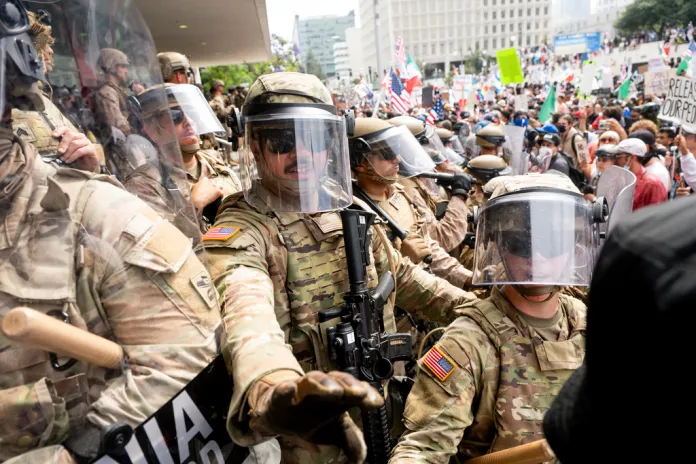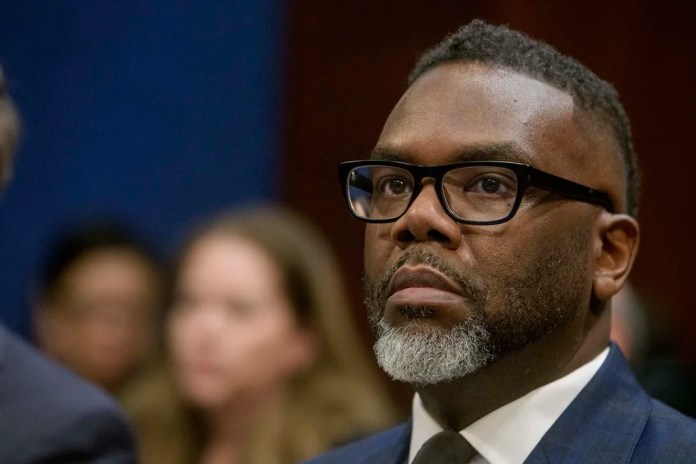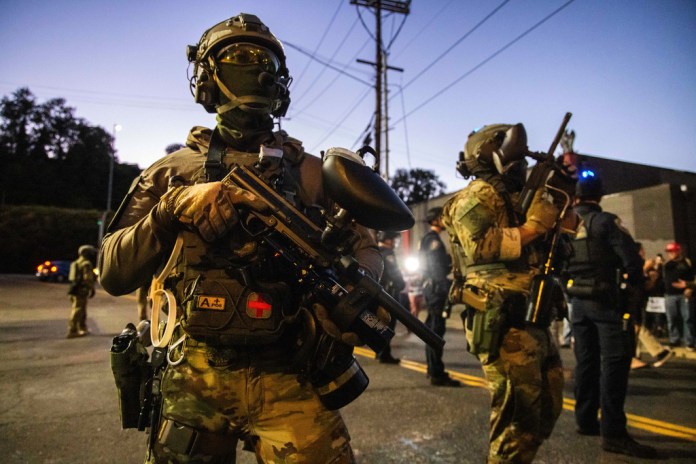


President Donald Trump’s push to deploy National Guard troops to Democratic-run cities is gathering strength despite a wave of lawsuits and conflicting rulings from federal judges, as legal experts say his administration is finding firmer constitutional footing to protect federal property and personnel.
Constitutional law expert John Shu told the Washington Examiner that the administration’s strategy, limiting National Guard activity to defensive missions around federal sites, places the president on strong legal ground even as states such as Illinois, Oregon, and California attempt to block the deployments. Trump’s moves follow weeks of agitation and unrest by protesters at Immigration and Customs Enforcement facilities and around personnel conducting immigration removal efforts, which the administration has said threatens the safety of federal agents and the surrounding areas.
Recommended Stories
- FBI fires agents who 'weaponized law enforcement' against US citizens, Patel says
- FBI ‘working hard’ to investigate Biden bribery evidence: Bondi
- Hundreds of ‘sponsors’ who exploited migrant children in Biden era arrested: Bondi

“Anyone who believes that it was kay for Eisenhower and JFK to send both National Guard and active Army troops in 1957 and 1962 to enforce federal law and federal interests, then, to be intellectually consistent, he or she has to also think that it is okay for Trump to do the same,” said Shu, referring to the 1957 Little Rock, Arkansas and 1962 Oxford, Mississippi desegregation crises, when presidents from both parties deployed active troops and federalized state national guards to enforce federal law over the objections of Democratic governors.
Shu emphasized that the president legally may send the National Guard to protect federal interests, such as ICE or DHS facilities, but not to patrol local streets or assume civilian policing duties. “The mere fact that police in some of these cities are unable or unwilling to enforce the law doesn’t automatically make the situation a riot,” he said.
“But when people start throwing fire bombs and cement blocks at ICE officers, trying to injure them, that’s certainly riotous behavior, and perhaps a full-on riot, and protecting those federal facilities and personnel is within the president’s authority.”
Illinois court declines to halt Guard mobilization
In Illinois, Democratic Gov. JB Pritzker and Chicago Mayor Brandon Johnson sued the administration on Monday, calling the National Guard deployments “illegal, dangerous, and unconstitutional” in a federal lawsuit. Yet in an early procedural win for the White House, U.S. District Judge April Perry, an appointee of former President Joe Biden, declined to immediately block the deployment, allowing troops to move forward while the Justice Department prepares its defense.
Justice Department lawyers told Perry in court that National Guard units from Illinois and Texas had already been activated to “protect federal officers and assets” in the Chicago area. The government has until Wednesday at midnight to file its response, indicating that the goal of sending troops to the crime-ridden city, an idea Trump has floated since the summer, can at least begin to materialize until any further action by the court.
Meanwhile, Johnson escalated his opposition by signing an executive order barring Immigration and Customs Enforcement agents from operating on city-owned property.

The White House’s Rapid Response 47 account on X blasted the move, accusing Johnson of “aiding and abetting criminal illegal immigrant killers, rapists, traffickers, and gang bangers.”
???? Chicago Mayor Brandon Johnson just announced he signed an executive order creating "ICE Free Zones" to ban ICE agents from city property.
— Rapid Response 47 (@RapidResponse47) October 6, 2025
This is SICK. He is aiding and abetting criminal illegal immigrant killers, rapists, traffickers, and gang bangers. pic.twitter.com/LaMbxaqePP
Shu, who served as a White House attorney in both terms of George W. Bush’s presidency, said Perry’s decision demonstrated the legal importance of a clear mission statement.
“If the president is very clear about what he intends for them to do — to stand guard over ICE facilities and protect federal officers from being harassed and shot at — and the governor still declines, first of all, the governor looks bad,” Shu said. “And second, the president could just send them in anyway.”
The elite Texas National Guard.
— Greg Abbott (@GregAbbott_TX) October 7, 2025
Ever ready.
Deploying now. pic.twitter.com/7lXe7Wpmue
Military personnel in uniforms with the Texas National Guard patch were seen Tuesday at the U.S. Army Reserve Center in Elwood, about 55 miles southwest of Chicago, according to an Associated Press report.
Oregon fight heads to appeals court Thursday

Out west, U.S. District Judge Karin Immergut, a Trump appointee, issued two consecutive rulings over the weekend blocking the administration from sending Guard troops into Portland. Immergut’s rulings, prompted by objections from Oregon and California, temporarily prevent National Guard deployments from any state into the city, despite continuing resistance from protesters and agitators who have threatened ICE agents for weeks.
The Justice Department has appealed those orders to the 9th Circuit Court of Appeals, which will hear arguments Thursday morning. The DOJ is seeking an emergency stay that would allow deployments to resume while the case proceeds.
California injunction remains paused, hearing set for later this month
In California, the administration continues to benefit from a favorable procedural ruling, one that the DOJ hopes to replicate in Portland. In September, U.S. District Judge Charles Breyer held that Trump’s use of National Guard troops in Los Angeles violated the Posse Comitatus Act, issuing an injunction temporarily blocking further activity.
But the 9th Circuit stayed that injunction, meaning it is not currently in effect. The appellate court has also scheduled oral arguments for Oct. 22 to hear the merits of the government’s bid to undo Breyer’s prior order.
The stay preserves the White House’s ability to redeploy Guard units to protect ICE and Department of Homeland Security sites statewide while the appeal is pending, despite fierce opposition from Gov. Gavin Newsom (D-CA).
A statutory maze adds to the uncertainty
Even as Trump gains momentum in the courts, he floated the idea this week of invoking the Insurrection Act to circumvent jurisdictions where lawsuits have gummed up his ability to send the National Guard where it’s needed. Meanwhile, constitutional lawyers say the broader confusion over the president’s authority to federalize the National Guard reflects deeper flaws in the law.
“The statutes dealing with federal control and deployment of the National Guard are an utter and complete mess,” Casey Mattox, a constitutional lawyer, wrote on X. “Undefined and seemingly contradictory terms. A real problem when it kind of matters.”
There are several overlapping provisions of the Insurrection Act, the Posse Comitatus Act, and Title 10 of the U.S. Code, which can create ambiguity over where presidential power begins and state control ends. This ambiguity has helped inspire the recent wave of lawsuits that states that feel as though their sovereignty is being overridden by the federal government.
For instance, while Title 32 allows governors to retain command of their Guard units during federally funded missions, Title 10 transfers control entirely to the president once troops are “federalized.” That distinction has fueled disputes in states such as Oregon and California, where governors argue that their Guard members cannot be deployed for federal immigration or riot-control operations without state consent.
“Here, Oregon does not consent to the deployment of Oregon National Guard members,” lawyers for the state wrote in their complaint against the deployment of 200 Portland National Guard troops to federal immigration facilities in downtown Portland.
Shu warned that invoking the Insurrection Act likely would be a political and legal mistake for President Trump, even though President Kennedy did in 1962.
“President Trump definitely does not want to do that at this point, for both political and legal reasons,” Shu said. “The Democrats falsely accused President Trump and the people who stormed the U.S. Capitol of being insurrectionists, and overextended the original meaning of the statute. They did that as a type of ‘lawfare,’ to try and prevent President Trump from ever running for office again. If President Trump were now to try and expand and broaden the usual definition of a ‘rebellion’ or ‘insurrection’ — it would be an unwise idea, legally, potentially make him look like a hypocrite, politically, and it looks terrible, generally.”
Historical and legal echoes to the civil rights movement
Legal experts have compared the current standoffs to President Dwight Eisenhower’s 1957 decision to send the 101st Airborne Division to Little Rock, Arkansas, and President John F. Kennedy’s 1962 deployment of National Guard troops to the University of Mississippi. In both cases, federal authority prevailed despite fierce state resistance.
“In those days, state and local police and state National Guard troops refused to enforce the Supreme Court’s order against segregation — Governor Orval Farbus even used Arkansas National Guard troops to block the students’ entry into school,” Shu said. “Today, state and local government officials wrongly tell federal officers that they can’t enforce federal immigration law and in some cases refuse to help them when they’re endangered. If JFK — a Democrat — can send in the XVIII Airborne Corps and place about 30,000 troops on standby in order to escort one guy — James Meredith — onto Ole Miss, then Trump can certainly send the Guard to protect ICE agents and other federal personnel who are just doing what the law commands them to do — their jobs,” Shu added.
Legal fights continue, but Trump’s footing improves
With Perry’s early decision in Illinois, the Ninth Circuit’s stay in California, and an expedited appeal underway in Oregon, Trump’s legal position appears to be improving after several early setbacks in the lower courts. The administration argues it is acting squarely within the law to secure federal facilities and personnel amid mounting resistance from sanctuary jurisdictions.
The Justice Department is due to file its next brief in the Illinois lawsuit by Wednesday evening, followed by oral arguments in the Oregon appeal Thursday morning and in the California case later this month, a trio of legal proceedings that could define how far Trump can go in deploying federal troops inside states that refuse to cooperate with his immigration enforcement agenda.
